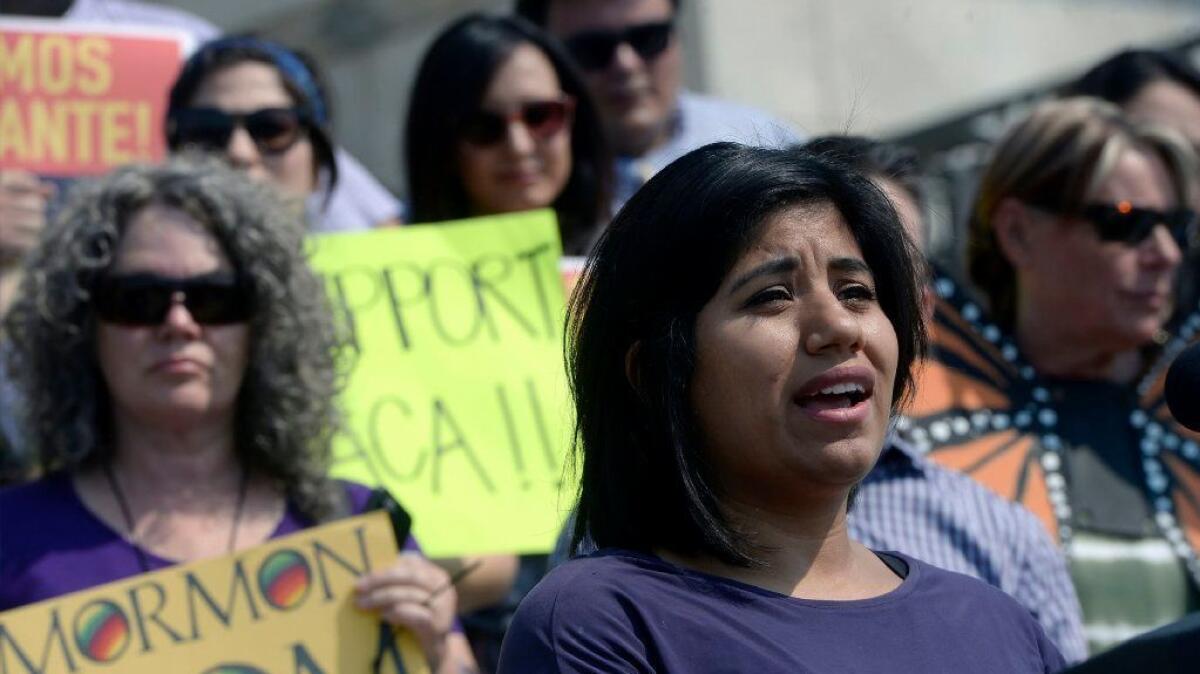Opinion: The bizarre debate over whether ‘Dreamers’ are kids or adults

- Share via
The controversy over President Trump’s slow-motion shutdown of the Deferred Action for Childhood Arrivals initiative has spawned a surreal side debate over the age of the 800,000 participants protected by the program.
“CNN And MSNBC Claim DACA-Recipients Are ‘Children’ ” blares the headline of a story in the conservative Daily Caller.
Sure enough, in video clips from those networks featured on The Daily Caller website, cable-TV guests including former Los Angeles Mayor Antonio Villaraigosa refer to the so-called Dreamers as “these kids.” In another clip, Rep. Carlos Curbelo (R-Fla.) calls them “America’s children.”
But The Daily Caller can’t be fooled. It reports: “While DACA recipients were illegally brought to the United States by their parents when they were children, the minimum age to apply for the program is 15 years old. In fact, the majority of the applicants were over the age of 20 based on 2014 data from the U.S. government. Some have estimated that the average age of Dreamers is 25 or 26 years old – hardly children.”
The Daily Caller isn’t alone in uncovering this amazing secret. After telling reporters on Tuesday that he had “great heart for these folks we’re talking about,” President Trump made a point of noting that “people think in terms of children but they’re really young adults.”
My first reaction to this argument was that it was bizarre as well as irrelevant: Was the implication that it would be OK to deport the Dreamers because they are in their 20s (maybe with acne scars, nose rings or tattoos) rather than winsome preteens squeezing stuffed animals?
But Trump and the Daily Caller were clutching at a kernel of truth: Those who were describing the Dreamers as kids were – consciously or unconsciously – seeking to capitalize on the natural sympathy people have for children, which is rooted not only in the fact that kids are cute and photogenic but also in assumptions about childhood innocence.
Of course, the Dreamers will always be innocent of entering the country illegally; that decision was made for them by their parents when the Dreamers were children. They’ll retain that original innocence when they’re in a retirement home.
Still, as a rhetorical matter, the Dreamers’ champions probably believe that it helps the cause with at least some people (grandparents?) to describe them as “kids” or “children” not just at the time of their arrival in the United States but in the present.
Maybe that explains why former Vice President Joe Biden finessed the time factor in his tweet supporting the Dreamers. “Brought by parents, these children had no choice in coming here,” Biden said. “Now they’ll be sent to countries they’ve never known. Cruel. Not America.”
This isn’t the first situation in which the label of “child” has been deployed to make someone who didn’t literally qualify seem more sympathetic. During his summation at the trial of George Zimmerman in the killing of 17-year-old Trayvon Martin, the prosecutor said: “Was that child not in fear when he was running from that defendant? Isn’t that every child’s worst nightmare, to be followed on the way home in the dark?”
Of course, when the defendant in a case is 17 years old, a prosecutor is more likely to refer to him as a “youth” or “young man.”
Actually, the fact that the Dreamers are now young adults arguably makes their situation more poignant because it’s a reminder of how long they have lived in the United States and how wrenching it would be for them to be uprooted and returned to homelands they may not even remember.
Still, it’s easy to see why the Dreamers’ defenders might want to refer to them as children. What’s hard to accept is the attempt to “expose” this innocuous rhetorical impulse as a fraud on an unsuspecting public.
Follow the Opinion section on Twitter @latimesopinion and Facebook
More to Read
A cure for the common opinion
Get thought-provoking perspectives with our weekly newsletter.
You may occasionally receive promotional content from the Los Angeles Times.










